Business Law: UK Classifications and Sources of Law
VerifiedAdded on 2023/06/09
|6
|2161
|295
AI Summary
This article discusses the UK classifications of laws, including criminal and civil law, and the sources of law, such as case laws and legislations. It also explains how the UK law making process has a direct impact on commercial organizations, using contract law as an example.
Contribute Materials
Your contribution can guide someone’s learning journey. Share your
documents today.
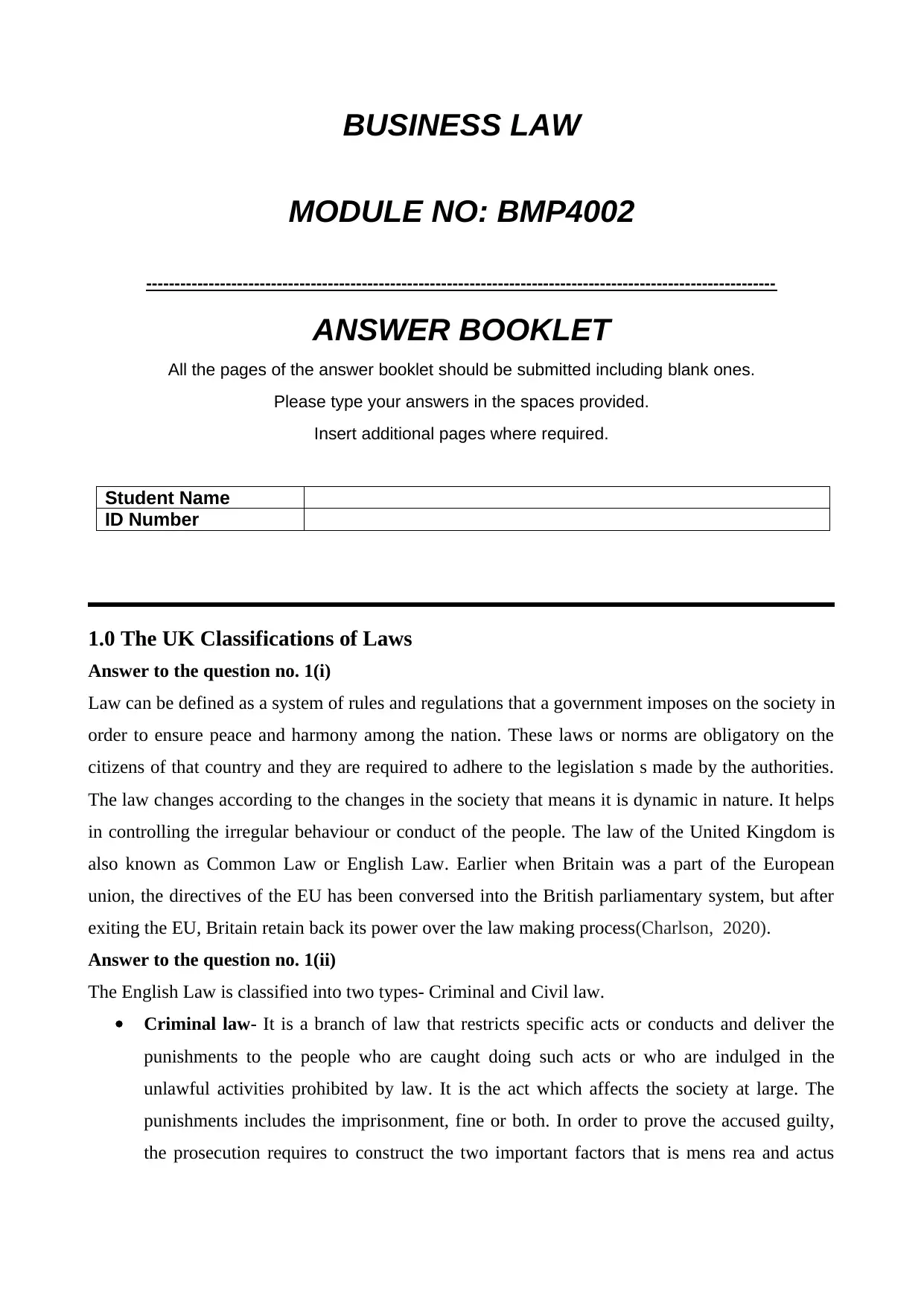
BUSINESS LAW
MODULE NO: BMP4002
---------------------------------------------------------------------------------------------------------------
ANSWER BOOKLET
All the pages of the answer booklet should be submitted including blank ones.
Please type your answers in the spaces provided.
Insert additional pages where required.
Student Name
ID Number
1.0 The UK Classifications of Laws
Answer to the question no. 1(i)
Law can be defined as a system of rules and regulations that a government imposes on the society in
order to ensure peace and harmony among the nation. These laws or norms are obligatory on the
citizens of that country and they are required to adhere to the legislation s made by the authorities.
The law changes according to the changes in the society that means it is dynamic in nature. It helps
in controlling the irregular behaviour or conduct of the people. The law of the United Kingdom is
also known as Common Law or English Law. Earlier when Britain was a part of the European
union, the directives of the EU has been conversed into the British parliamentary system, but after
exiting the EU, Britain retain back its power over the law making process(Charlson, 2020).
Answer to the question no. 1(ii)
The English Law is classified into two types- Criminal and Civil law.
Criminal law- It is a branch of law that restricts specific acts or conducts and deliver the
punishments to the people who are caught doing such acts or who are indulged in the
unlawful activities prohibited by law. It is the act which affects the society at large. The
punishments includes the imprisonment, fine or both. In order to prove the accused guilty,
the prosecution requires to construct the two important factors that is mens rea and actus
MODULE NO: BMP4002
---------------------------------------------------------------------------------------------------------------
ANSWER BOOKLET
All the pages of the answer booklet should be submitted including blank ones.
Please type your answers in the spaces provided.
Insert additional pages where required.
Student Name
ID Number
1.0 The UK Classifications of Laws
Answer to the question no. 1(i)
Law can be defined as a system of rules and regulations that a government imposes on the society in
order to ensure peace and harmony among the nation. These laws or norms are obligatory on the
citizens of that country and they are required to adhere to the legislation s made by the authorities.
The law changes according to the changes in the society that means it is dynamic in nature. It helps
in controlling the irregular behaviour or conduct of the people. The law of the United Kingdom is
also known as Common Law or English Law. Earlier when Britain was a part of the European
union, the directives of the EU has been conversed into the British parliamentary system, but after
exiting the EU, Britain retain back its power over the law making process(Charlson, 2020).
Answer to the question no. 1(ii)
The English Law is classified into two types- Criminal and Civil law.
Criminal law- It is a branch of law that restricts specific acts or conducts and deliver the
punishments to the people who are caught doing such acts or who are indulged in the
unlawful activities prohibited by law. It is the act which affects the society at large. The
punishments includes the imprisonment, fine or both. In order to prove the accused guilty,
the prosecution requires to construct the two important factors that is mens rea and actus
Secure Best Marks with AI Grader
Need help grading? Try our AI Grader for instant feedback on your assignments.

reus, which means the involvement of guilty mind and an unlawful act following the motive
formed under the former element(Edmonds, 2019).
2 of 6
formed under the former element(Edmonds, 2019).
2 of 6
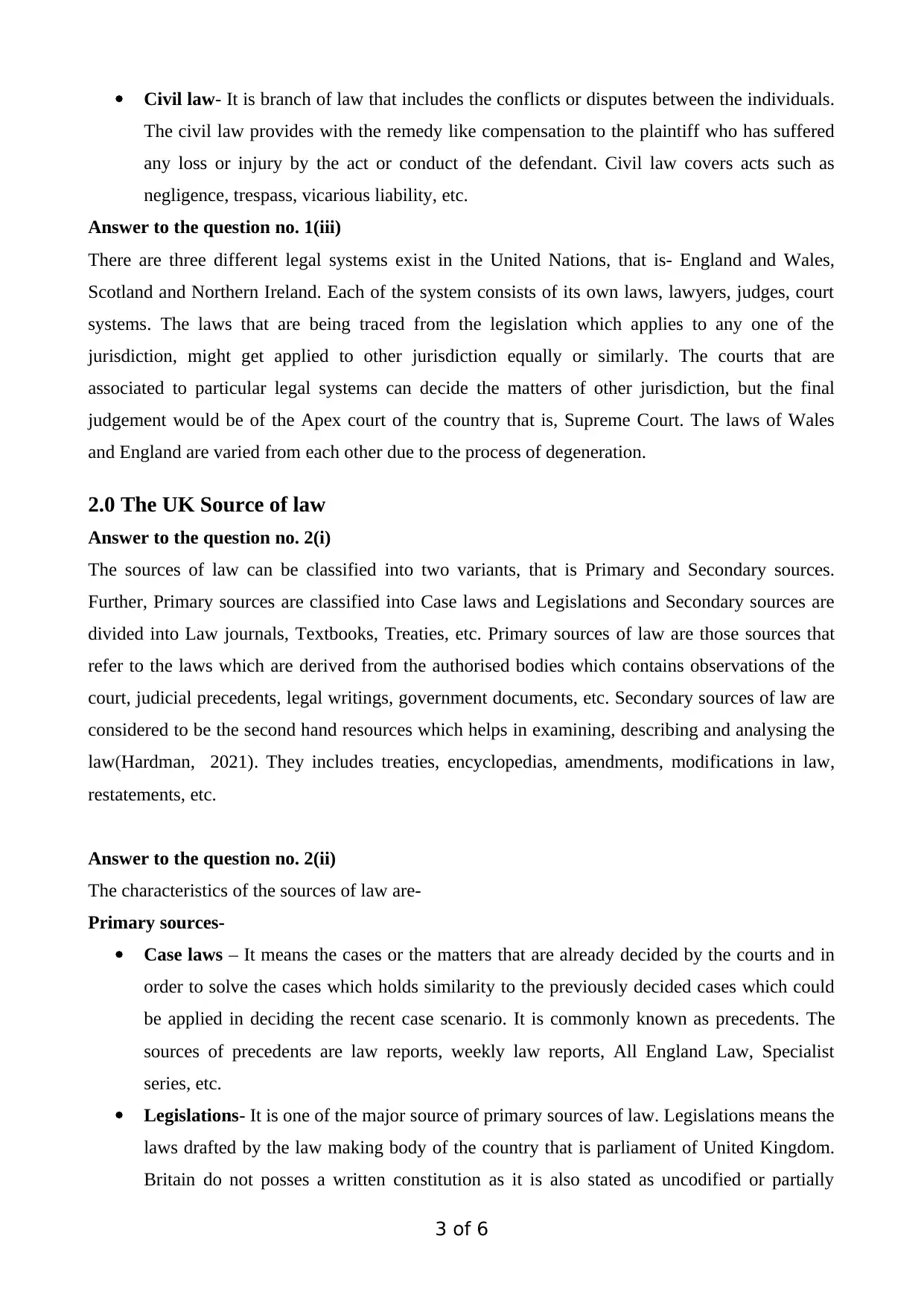
Civil law- It is branch of law that includes the conflicts or disputes between the individuals.
The civil law provides with the remedy like compensation to the plaintiff who has suffered
any loss or injury by the act or conduct of the defendant. Civil law covers acts such as
negligence, trespass, vicarious liability, etc.
Answer to the question no. 1(iii)
There are three different legal systems exist in the United Nations, that is- England and Wales,
Scotland and Northern Ireland. Each of the system consists of its own laws, lawyers, judges, court
systems. The laws that are being traced from the legislation which applies to any one of the
jurisdiction, might get applied to other jurisdiction equally or similarly. The courts that are
associated to particular legal systems can decide the matters of other jurisdiction, but the final
judgement would be of the Apex court of the country that is, Supreme Court. The laws of Wales
and England are varied from each other due to the process of degeneration.
2.0 The UK Source of law
Answer to the question no. 2(i)
The sources of law can be classified into two variants, that is Primary and Secondary sources.
Further, Primary sources are classified into Case laws and Legislations and Secondary sources are
divided into Law journals, Textbooks, Treaties, etc. Primary sources of law are those sources that
refer to the laws which are derived from the authorised bodies which contains observations of the
court, judicial precedents, legal writings, government documents, etc. Secondary sources of law are
considered to be the second hand resources which helps in examining, describing and analysing the
law(Hardman, 2021). They includes treaties, encyclopedias, amendments, modifications in law,
restatements, etc.
Answer to the question no. 2(ii)
The characteristics of the sources of law are-
Primary sources-
Case laws – It means the cases or the matters that are already decided by the courts and in
order to solve the cases which holds similarity to the previously decided cases which could
be applied in deciding the recent case scenario. It is commonly known as precedents. The
sources of precedents are law reports, weekly law reports, All England Law, Specialist
series, etc.
Legislations- It is one of the major source of primary sources of law. Legislations means the
laws drafted by the law making body of the country that is parliament of United Kingdom.
Britain do not posses a written constitution as it is also stated as uncodified or partially
3 of 6
The civil law provides with the remedy like compensation to the plaintiff who has suffered
any loss or injury by the act or conduct of the defendant. Civil law covers acts such as
negligence, trespass, vicarious liability, etc.
Answer to the question no. 1(iii)
There are three different legal systems exist in the United Nations, that is- England and Wales,
Scotland and Northern Ireland. Each of the system consists of its own laws, lawyers, judges, court
systems. The laws that are being traced from the legislation which applies to any one of the
jurisdiction, might get applied to other jurisdiction equally or similarly. The courts that are
associated to particular legal systems can decide the matters of other jurisdiction, but the final
judgement would be of the Apex court of the country that is, Supreme Court. The laws of Wales
and England are varied from each other due to the process of degeneration.
2.0 The UK Source of law
Answer to the question no. 2(i)
The sources of law can be classified into two variants, that is Primary and Secondary sources.
Further, Primary sources are classified into Case laws and Legislations and Secondary sources are
divided into Law journals, Textbooks, Treaties, etc. Primary sources of law are those sources that
refer to the laws which are derived from the authorised bodies which contains observations of the
court, judicial precedents, legal writings, government documents, etc. Secondary sources of law are
considered to be the second hand resources which helps in examining, describing and analysing the
law(Hardman, 2021). They includes treaties, encyclopedias, amendments, modifications in law,
restatements, etc.
Answer to the question no. 2(ii)
The characteristics of the sources of law are-
Primary sources-
Case laws – It means the cases or the matters that are already decided by the courts and in
order to solve the cases which holds similarity to the previously decided cases which could
be applied in deciding the recent case scenario. It is commonly known as precedents. The
sources of precedents are law reports, weekly law reports, All England Law, Specialist
series, etc.
Legislations- It is one of the major source of primary sources of law. Legislations means the
laws drafted by the law making body of the country that is parliament of United Kingdom.
Britain do not posses a written constitution as it is also stated as uncodified or partially
3 of 6
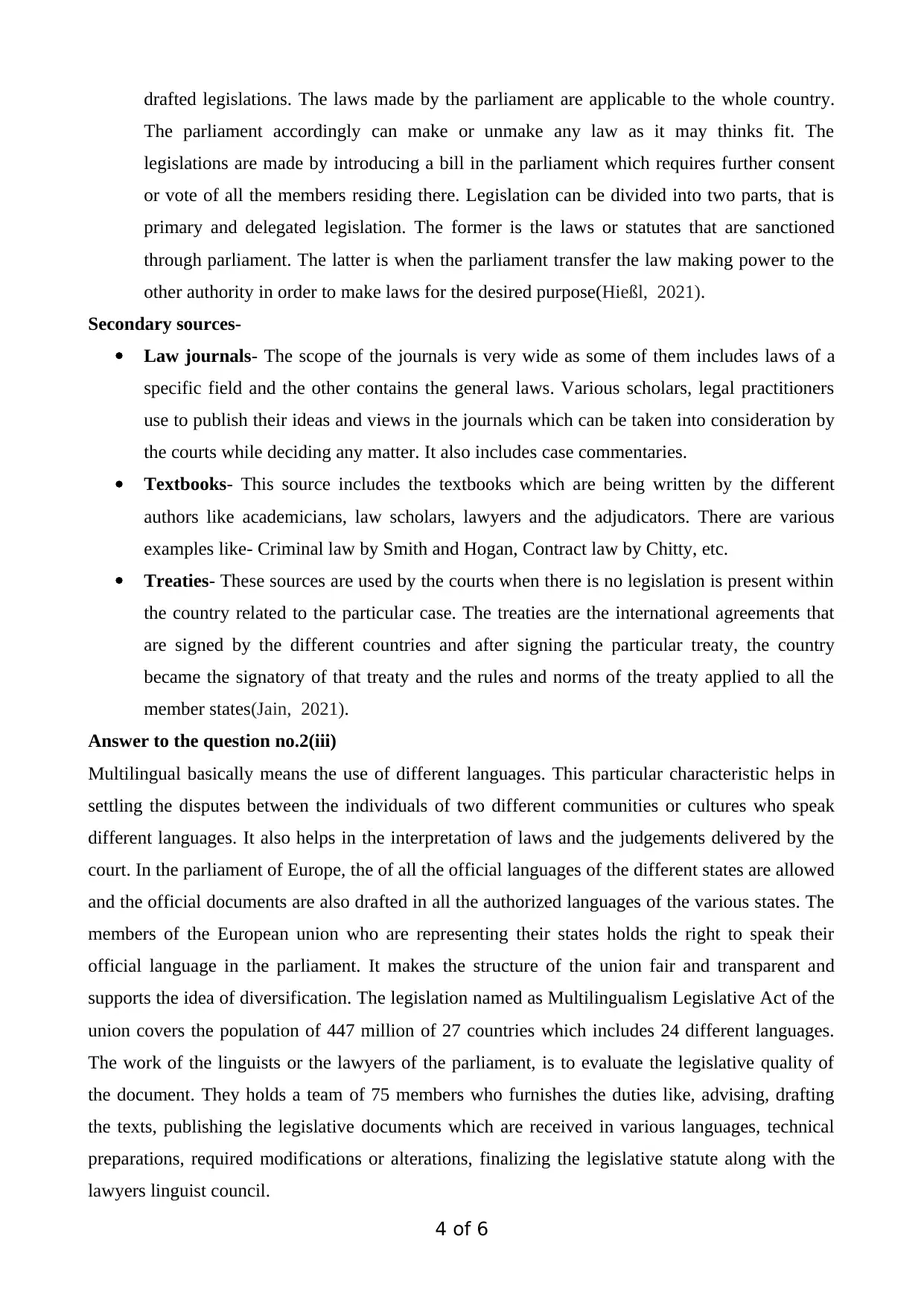
drafted legislations. The laws made by the parliament are applicable to the whole country.
The parliament accordingly can make or unmake any law as it may thinks fit. The
legislations are made by introducing a bill in the parliament which requires further consent
or vote of all the members residing there. Legislation can be divided into two parts, that is
primary and delegated legislation. The former is the laws or statutes that are sanctioned
through parliament. The latter is when the parliament transfer the law making power to the
other authority in order to make laws for the desired purpose(Hießl, 2021).
Secondary sources-
Law journals- The scope of the journals is very wide as some of them includes laws of a
specific field and the other contains the general laws. Various scholars, legal practitioners
use to publish their ideas and views in the journals which can be taken into consideration by
the courts while deciding any matter. It also includes case commentaries.
Textbooks- This source includes the textbooks which are being written by the different
authors like academicians, law scholars, lawyers and the adjudicators. There are various
examples like- Criminal law by Smith and Hogan, Contract law by Chitty, etc.
Treaties- These sources are used by the courts when there is no legislation is present within
the country related to the particular case. The treaties are the international agreements that
are signed by the different countries and after signing the particular treaty, the country
became the signatory of that treaty and the rules and norms of the treaty applied to all the
member states(Jain, 2021).
Answer to the question no.2(iii)
Multilingual basically means the use of different languages. This particular characteristic helps in
settling the disputes between the individuals of two different communities or cultures who speak
different languages. It also helps in the interpretation of laws and the judgements delivered by the
court. In the parliament of Europe, the of all the official languages of the different states are allowed
and the official documents are also drafted in all the authorized languages of the various states. The
members of the European union who are representing their states holds the right to speak their
official language in the parliament. It makes the structure of the union fair and transparent and
supports the idea of diversification. The legislation named as Multilingualism Legislative Act of the
union covers the population of 447 million of 27 countries which includes 24 different languages.
The work of the linguists or the lawyers of the parliament, is to evaluate the legislative quality of
the document. They holds a team of 75 members who furnishes the duties like, advising, drafting
the texts, publishing the legislative documents which are received in various languages, technical
preparations, required modifications or alterations, finalizing the legislative statute along with the
lawyers linguist council.
4 of 6
The parliament accordingly can make or unmake any law as it may thinks fit. The
legislations are made by introducing a bill in the parliament which requires further consent
or vote of all the members residing there. Legislation can be divided into two parts, that is
primary and delegated legislation. The former is the laws or statutes that are sanctioned
through parliament. The latter is when the parliament transfer the law making power to the
other authority in order to make laws for the desired purpose(Hießl, 2021).
Secondary sources-
Law journals- The scope of the journals is very wide as some of them includes laws of a
specific field and the other contains the general laws. Various scholars, legal practitioners
use to publish their ideas and views in the journals which can be taken into consideration by
the courts while deciding any matter. It also includes case commentaries.
Textbooks- This source includes the textbooks which are being written by the different
authors like academicians, law scholars, lawyers and the adjudicators. There are various
examples like- Criminal law by Smith and Hogan, Contract law by Chitty, etc.
Treaties- These sources are used by the courts when there is no legislation is present within
the country related to the particular case. The treaties are the international agreements that
are signed by the different countries and after signing the particular treaty, the country
became the signatory of that treaty and the rules and norms of the treaty applied to all the
member states(Jain, 2021).
Answer to the question no.2(iii)
Multilingual basically means the use of different languages. This particular characteristic helps in
settling the disputes between the individuals of two different communities or cultures who speak
different languages. It also helps in the interpretation of laws and the judgements delivered by the
court. In the parliament of Europe, the of all the official languages of the different states are allowed
and the official documents are also drafted in all the authorized languages of the various states. The
members of the European union who are representing their states holds the right to speak their
official language in the parliament. It makes the structure of the union fair and transparent and
supports the idea of diversification. The legislation named as Multilingualism Legislative Act of the
union covers the population of 447 million of 27 countries which includes 24 different languages.
The work of the linguists or the lawyers of the parliament, is to evaluate the legislative quality of
the document. They holds a team of 75 members who furnishes the duties like, advising, drafting
the texts, publishing the legislative documents which are received in various languages, technical
preparations, required modifications or alterations, finalizing the legislative statute along with the
lawyers linguist council.
4 of 6
Secure Best Marks with AI Grader
Need help grading? Try our AI Grader for instant feedback on your assignments.
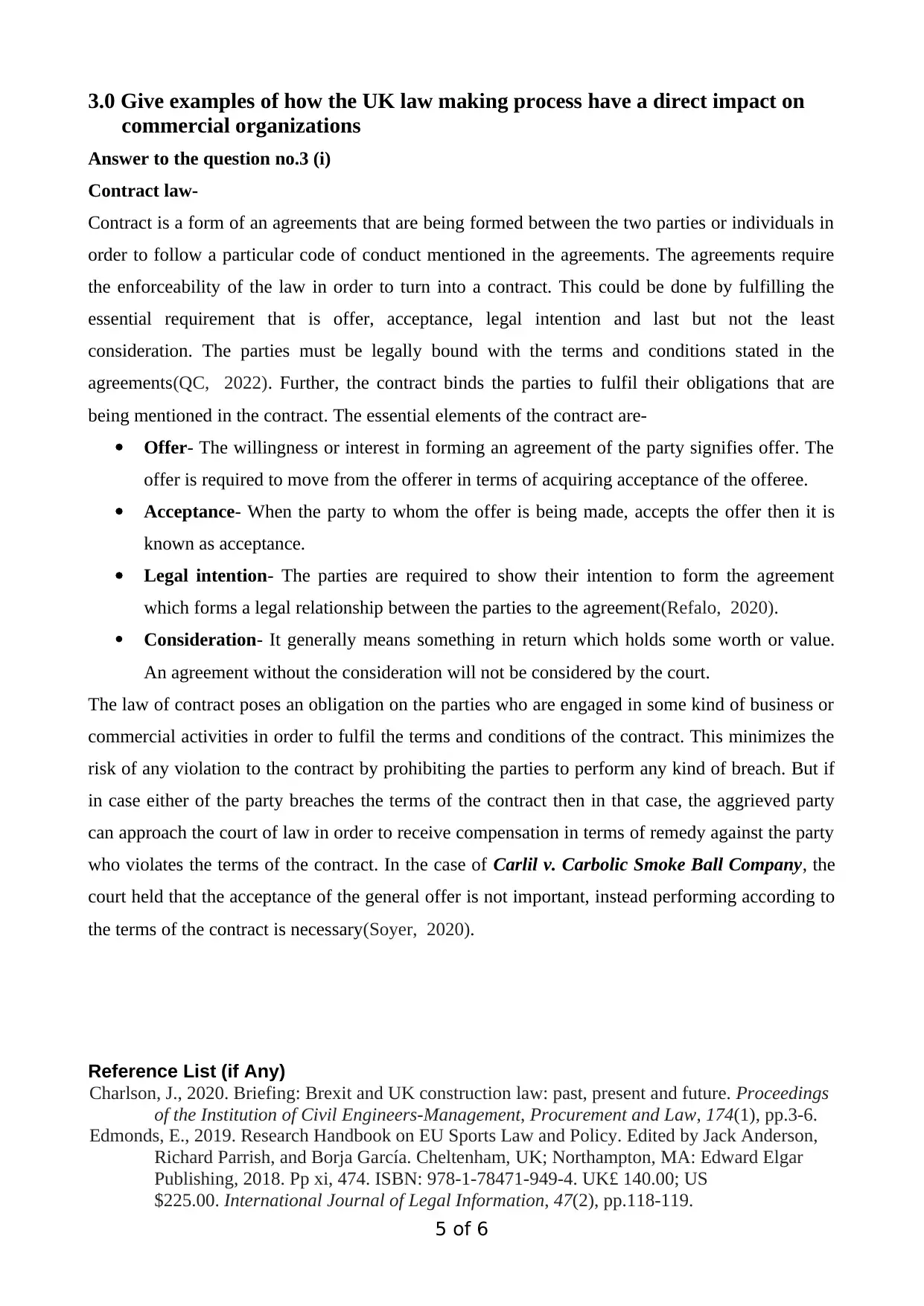
3.0 Give examples of how the UK law making process have a direct impact on
commercial organizations
Answer to the question no.3 (i)
Contract law-
Contract is a form of an agreements that are being formed between the two parties or individuals in
order to follow a particular code of conduct mentioned in the agreements. The agreements require
the enforceability of the law in order to turn into a contract. This could be done by fulfilling the
essential requirement that is offer, acceptance, legal intention and last but not the least
consideration. The parties must be legally bound with the terms and conditions stated in the
agreements(QC, 2022). Further, the contract binds the parties to fulfil their obligations that are
being mentioned in the contract. The essential elements of the contract are-
Offer- The willingness or interest in forming an agreement of the party signifies offer. The
offer is required to move from the offerer in terms of acquiring acceptance of the offeree.
Acceptance- When the party to whom the offer is being made, accepts the offer then it is
known as acceptance.
Legal intention- The parties are required to show their intention to form the agreement
which forms a legal relationship between the parties to the agreement(Refalo, 2020).
Consideration- It generally means something in return which holds some worth or value.
An agreement without the consideration will not be considered by the court.
The law of contract poses an obligation on the parties who are engaged in some kind of business or
commercial activities in order to fulfil the terms and conditions of the contract. This minimizes the
risk of any violation to the contract by prohibiting the parties to perform any kind of breach. But if
in case either of the party breaches the terms of the contract then in that case, the aggrieved party
can approach the court of law in order to receive compensation in terms of remedy against the party
who violates the terms of the contract. In the case of Carlil v. Carbolic Smoke Ball Company, the
court held that the acceptance of the general offer is not important, instead performing according to
the terms of the contract is necessary(Soyer, 2020).
Reference List (if Any)
Charlson, J., 2020. Briefing: Brexit and UK construction law: past, present and future. Proceedings
of the Institution of Civil Engineers-Management, Procurement and Law, 174(1), pp.3-6.
Edmonds, E., 2019. Research Handbook on EU Sports Law and Policy. Edited by Jack Anderson,
Richard Parrish, and Borja García. Cheltenham, UK; Northampton, MA: Edward Elgar
Publishing, 2018. Pp xi, 474. ISBN: 978-1-78471-949-4. UK£ 140.00; US
$225.00. International Journal of Legal Information, 47(2), pp.118-119.
5 of 6
commercial organizations
Answer to the question no.3 (i)
Contract law-
Contract is a form of an agreements that are being formed between the two parties or individuals in
order to follow a particular code of conduct mentioned in the agreements. The agreements require
the enforceability of the law in order to turn into a contract. This could be done by fulfilling the
essential requirement that is offer, acceptance, legal intention and last but not the least
consideration. The parties must be legally bound with the terms and conditions stated in the
agreements(QC, 2022). Further, the contract binds the parties to fulfil their obligations that are
being mentioned in the contract. The essential elements of the contract are-
Offer- The willingness or interest in forming an agreement of the party signifies offer. The
offer is required to move from the offerer in terms of acquiring acceptance of the offeree.
Acceptance- When the party to whom the offer is being made, accepts the offer then it is
known as acceptance.
Legal intention- The parties are required to show their intention to form the agreement
which forms a legal relationship between the parties to the agreement(Refalo, 2020).
Consideration- It generally means something in return which holds some worth or value.
An agreement without the consideration will not be considered by the court.
The law of contract poses an obligation on the parties who are engaged in some kind of business or
commercial activities in order to fulfil the terms and conditions of the contract. This minimizes the
risk of any violation to the contract by prohibiting the parties to perform any kind of breach. But if
in case either of the party breaches the terms of the contract then in that case, the aggrieved party
can approach the court of law in order to receive compensation in terms of remedy against the party
who violates the terms of the contract. In the case of Carlil v. Carbolic Smoke Ball Company, the
court held that the acceptance of the general offer is not important, instead performing according to
the terms of the contract is necessary(Soyer, 2020).
Reference List (if Any)
Charlson, J., 2020. Briefing: Brexit and UK construction law: past, present and future. Proceedings
of the Institution of Civil Engineers-Management, Procurement and Law, 174(1), pp.3-6.
Edmonds, E., 2019. Research Handbook on EU Sports Law and Policy. Edited by Jack Anderson,
Richard Parrish, and Borja García. Cheltenham, UK; Northampton, MA: Edward Elgar
Publishing, 2018. Pp xi, 474. ISBN: 978-1-78471-949-4. UK£ 140.00; US
$225.00. International Journal of Legal Information, 47(2), pp.118-119.
5 of 6
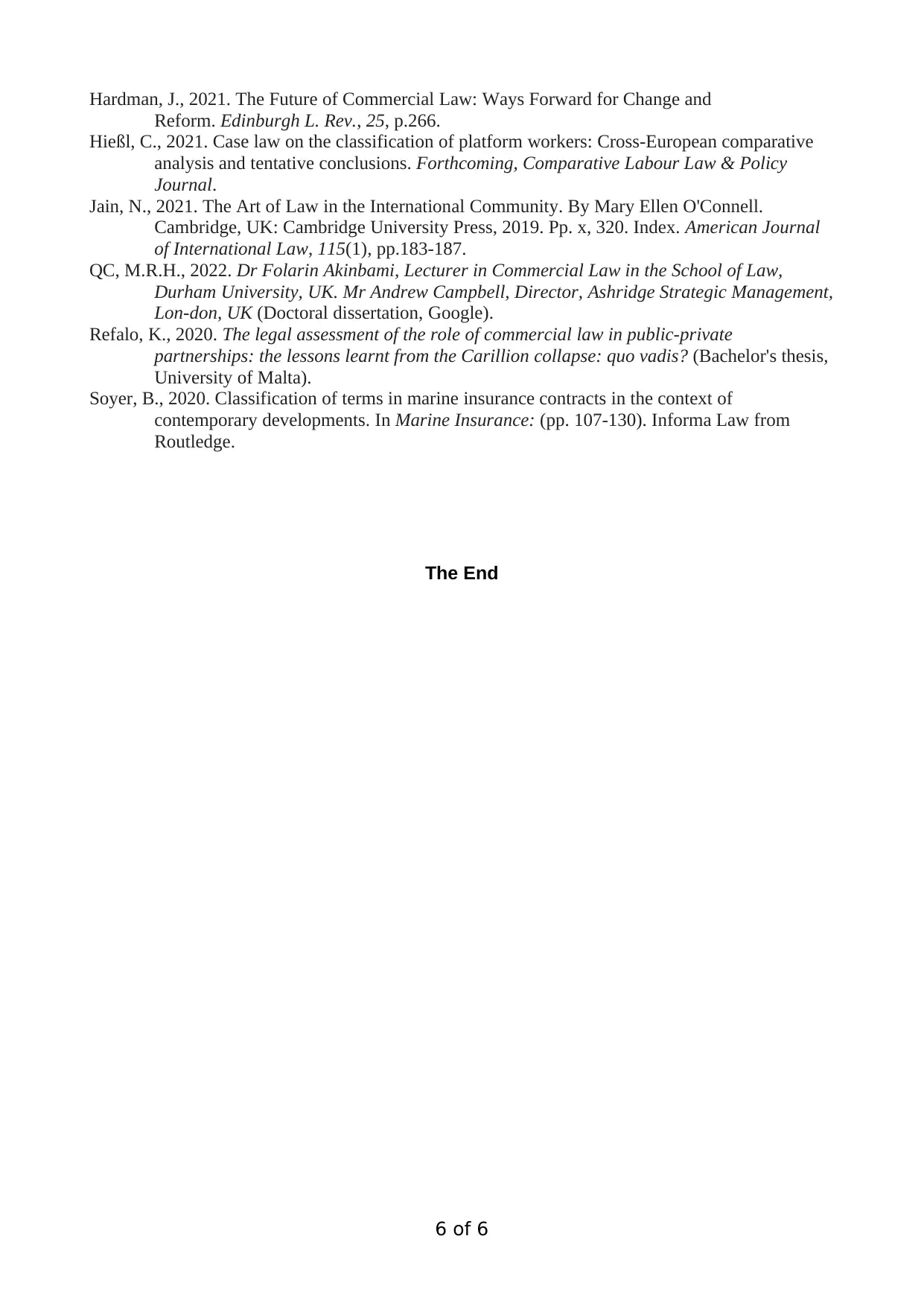
Hardman, J., 2021. The Future of Commercial Law: Ways Forward for Change and
Reform. Edinburgh L. Rev., 25, p.266.
Hießl, C., 2021. Case law on the classification of platform workers: Cross-European comparative
analysis and tentative conclusions. Forthcoming, Comparative Labour Law & Policy
Journal.
Jain, N., 2021. The Art of Law in the International Community. By Mary Ellen O'Connell.
Cambridge, UK: Cambridge University Press, 2019. Pp. x, 320. Index. American Journal
of International Law, 115(1), pp.183-187.
QC, M.R.H., 2022. Dr Folarin Akinbami, Lecturer in Commercial Law in the School of Law,
Durham University, UK. Mr Andrew Campbell, Director, Ashridge Strategic Management,
Lon-don, UK (Doctoral dissertation, Google).
Refalo, K., 2020. The legal assessment of the role of commercial law in public-private
partnerships: the lessons learnt from the Carillion collapse: quo vadis? (Bachelor's thesis,
University of Malta).
Soyer, B., 2020. Classification of terms in marine insurance contracts in the context of
contemporary developments. In Marine Insurance: (pp. 107-130). Informa Law from
Routledge.
The End
6 of 6
Reform. Edinburgh L. Rev., 25, p.266.
Hießl, C., 2021. Case law on the classification of platform workers: Cross-European comparative
analysis and tentative conclusions. Forthcoming, Comparative Labour Law & Policy
Journal.
Jain, N., 2021. The Art of Law in the International Community. By Mary Ellen O'Connell.
Cambridge, UK: Cambridge University Press, 2019. Pp. x, 320. Index. American Journal
of International Law, 115(1), pp.183-187.
QC, M.R.H., 2022. Dr Folarin Akinbami, Lecturer in Commercial Law in the School of Law,
Durham University, UK. Mr Andrew Campbell, Director, Ashridge Strategic Management,
Lon-don, UK (Doctoral dissertation, Google).
Refalo, K., 2020. The legal assessment of the role of commercial law in public-private
partnerships: the lessons learnt from the Carillion collapse: quo vadis? (Bachelor's thesis,
University of Malta).
Soyer, B., 2020. Classification of terms in marine insurance contracts in the context of
contemporary developments. In Marine Insurance: (pp. 107-130). Informa Law from
Routledge.
The End
6 of 6
1 out of 6
Related Documents
Your All-in-One AI-Powered Toolkit for Academic Success.
+13062052269
info@desklib.com
Available 24*7 on WhatsApp / Email
![[object Object]](/_next/static/media/star-bottom.7253800d.svg)
Unlock your academic potential
© 2024 | Zucol Services PVT LTD | All rights reserved.



